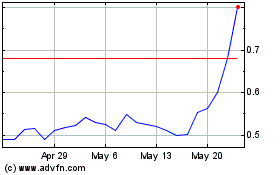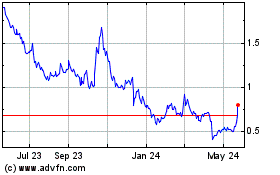Purple Biotech Ltd. ("Purple Biotech" or "the Company")
(NASDAQ/TASE: PPBT), a clinical-stage company developing
first-in-class therapies that overcome tumor immune evasion and
drug resistance, today reported new positive biomarker findings for
its lead oncology therapeutic candidate CM24. These data were
presented yesterday at the American Association for Cancer
Research® (AACR) Special Conference on Advances in Pancreatic
Cancer Research currently ongoing in Boston, in a poster titled,
“Exploratory biomarker evaluation of the randomized Phase 2 cohort
of CM24 in combination with nivolumab and chemotherapy in
advanced/metastatic pancreatic cancer”.
“We are excited to present additional positive
interim data from our Phase 2 study with CM24. CEACAM1 as a novel
target in oncology continues to be supported by these data,
underscoring its potential given its high expression on cancer
cells, tumor infiltrating leucocytes and on NETs, suggesting the
potential multiple roles of CM24 in overcoming immune evasion,”
stated Purple Biotech CEO Gil Efron. “Moreover, these data enable
us to potentially design biomarker- guided studies for CM24 for the
treatment of pancreatic ductal adenocarcinoma (PDAC), as well as
other cancers.”
Purple Biotech’s Phase 2 study is evaluating
CM24 in combination with Bristol Myers Squibb's PD-1 inhibitor
nivolumab plus standard of care (SoC) chemotherapy as a second line
treatment of patients with PDAC and compared to SoC chemotherapy
alone. Sixty-three patients have been enrolled in the randomized
study across 18 centers in the U.S., Spain, and Israel.
The following is a summary of findings presented
in the poster:
Mechanism of Action
CM24 blocks CEACAM1 interactions, which have key
roles in cancer progression, immune escape and metastasis. CEACAM1
is part of the NET complex, involved in tumor immune evasion,
metastasis and cancer-associated thrombosis, affecting patient
survival. Purple Biotech has previously presented data that
demonstrates that CM24 binds to CEACAM1 on NETs, suppresses
NET-induced migration of cancer cells and inhibits in-vivo tumor
metastasis. In the poster, Purple Biotech presents data that
demonstrates that CM24 also inhibits NET-induced platelet
aggregation, an in-vitro assay imitating the thrombosis
process.
CM24+nivolumab+Nal-IRI/5FU/LV treatment of PDAC
patients reduced serum levels of the NET marker, MPO, and showed
potential overall survival (OS) benefit to patients with reduced
post-dose MPO as compared to the control arm.
NET Marker MPO as a Potential Serum
Biomarker for Patient Selection for CM24-Based Therapy
An analysis of patients with serum MPO levels
< 350 ng/mL, demonstrated a potential 62% reduction in risk of
death (HR=0.38) for CM24+nivolumab+Nal-IRI/5FU/LV therapy in PDAC
patients, and prolongation of 3.3 months in median OS. This
compared to an analysis of all patients which demonstrated a
potential 25% reduction in risk of death (HR=0.75) and prolongation
of 2.1 months in median OS.
High Tumor CEACAM1 & Low PDL1 as
Potential Biomarkers for CM24-Based Therapy
An analysis of patients with high CEACAM1+tumor
cells (H-score > 115) or low PDL1 (CPS ≤ 1) demonstrated a
potential 45% and 65% reduction in risk of death (HR=0.55 and
0.35), respectively.
Combining these two potential biomarkers,
suggests augmented outcome of 90% reduction in risk of death
(HR=0.1) for CM24+nivolumab+Nal-IRI/5FU/LV therapy in PDAC
patients, and prolongation of 4.1 months in median OS (p value
0.01).
“A serum biomarker for patient selection is a
major advantage for cancer patients in general and PDAC patients in
particular. The additional interim data suggesting serum NET levels
as a potential biomarker for improving the outcome of CM24-based
therapy, together with the ability of this therapy to reduce serum
NET levels in PDAC patients and to inhibit NET-related activities
in vitro, add supporting evidence for NETs as a new mechanism of
action (MoA) and potential biomarker for CM24-based therapy,” said
Dr. Hadas Reuveni, VP R&D of Purple Biotech. “Additional
encouraging results suggesting that the CM24/
nivolumab/chemotherapy effect is most pronounced among patients
with high CEACAM1 expression and low PDL1 also relate to the
CM24/nivolumab MoA and support the CM24/nivolumab combined
treatment. This may open a new opportunity for patients who are not
eligible for anti-PD1 therapy in various indications. A larger
sample size is required to confirm the results and better define
the cutoff values.”
Interim data from Purple Biotech’s Phase 2 study
presented in June at the 2024 American Society of Clinical Oncology
(ASCO) Annual Meeting demonstrated improvement in OS, progression
free survival (PFS), objective response rate (ORR) and all other
efficacy endpoints in the CM24+nivolumab+Nal-IRI/5FU/LV
experimental arm as compared with the SoC control arm. Topline data
are expected in the fourth quarter of 2024.
The poster is available on the Publications
section of Purple Biotech’s website and in the following link:
https://purple-biotech.com/pipeline/#1Publications
About Purple Biotech
Purple Biotech Ltd. (NASDAQ/TASE: PPBT) is a
clinical-stage company developing first-in-class therapies that
seek to overcome tumor immune evasion and drug resistance. The
Company's oncology pipeline includes CM24, NT219 and IM1240. CM24
is a humanized monoclonal antibody that blocks CEACAM1, that
supports tumor immune evasion and survival through multiple
pathways. CEACAM1 on tumor cells, immune cells and neutrophils
extracellular traps is a novel target for the treatment of multiple
cancer indications. As a proof of concept of these novel pathways,
the Company is advancing CM24 as a combination therapy with
anti-PD-1 checkpoint inhibitors in a Phase 2 study for the
treatment of pancreatic ductal adenocarcinoma (PDAC). The Company
has entered into a clinical collaboration agreement with Bristol
Myers Squibb for the Phase 2 clinical trials to evaluate the
combination of CM24 with the PD-1 inhibitor nivolumab in addition
to chemotherapy. NT219 is a dual inhibitor, novel small molecule
that simultaneously targets IRS1/2 and STAT3. A Phase 1 dose
escalation study was concluded as a monotherapy and in combination
with cetuximab in which NT219 demonstrated anti-tumor activity in
combination with cetuximab in second line patients with recurrent
and/or metastatic SCCHN (R/N SCCHN). The Company is advancing
CAPTN-3, a preclinical platform of conditionally-activated
tri-specific antibody that engages both T cells and NK cells to
induce a strong, localized immune response within the tumor
microenvironment. The cleavable capping technology confines the
compound's therapeutic activity to the local tumor
microenvironment, and thereby potentially increases the anticipated
therapeutic window in patients. The third arm specifically targets
the Tumor Associated Antigen (TAA). The technology presents a novel
mechanism of action by unleashing both innate and adaptive immune
systems to mount an optimal anti-tumoral immune response. IM1240 is
the first tri-specific antibody in development that targets 5T4
expressed in a variety of solid tumors and is correlated with
advanced disease, increased invasiveness and poor clinical
outcomes. The Company's corporate headquarters are located in
Rehovot, Israel. For more information, please
visit https://purple-biotech.com/.
Forward-Looking Statements and Safe Harbor
Statement
Certain statements in this press release that
are forward-looking and not statements of historical fact are
forward-looking statements within the meaning of the safe harbor
provisions of the Private Securities Litigation Reform Act of 1995.
Such forward-looking statements include, but are not limited to,
statements that are not statements of historical fact, and may be
identified by words such as "believe", "expect", "intend", "plan",
"may", "should", "could", "might", "seek", "target", "will",
"project", "forecast", "continue" or "anticipate" or their
negatives or variations of these words or other comparable words or
by the fact that these statements do not relate strictly to
historical matters. You should not place undue reliance on these
forward-looking statements, which are not guarantees of future
performance. Forward-looking statements reflect our current views,
expectations, beliefs or intentions with respect to future events,
and are subject to a number of assumptions, involve known and
unknown risks, many of which are beyond our control, as well as
uncertainties and other factors that may cause our actual results,
performance or achievements to be significantly different from any
future results, performance or achievements expressed or implied by
the forward-looking statements. Important factors that could cause
or contribute to such differences include, among others, risks
relating to: the plans, strategies and objectives of management for
future operations; product development for NT219, CM24 and IM1240;
the process by which such early stage therapeutic candidates could
potentially lead to an approved drug product is long and subject to
highly significant risks, particularly with respect to a joint
development collaboration; the fact that drug development and
commercialization involves a lengthy and expensive process with
uncertain outcomes; our ability to successfully develop and
commercialize our pharmaceutical products; the expense, length,
progress and results of any clinical trials; the impact of any
changes in regulation and legislation that could affect the
pharmaceutical industry; the difficulty in receiving the regulatory
approvals necessary in order to commercialize our products; the
difficulty of predicting actions of the U.S. Food and Drug
Administration or any other applicable regulator of pharmaceutical
products; the regulatory environment and changes in the health
policies and regimes in the countries in which we operate; the
uncertainty surrounding the actual market reception to our
pharmaceutical products once cleared for marketing in a particular
market; the introduction of competing products; patents obtained by
competitors; dependence on the effectiveness of our patents and
other protections for innovative products; our ability to obtain,
maintain and defend issued patents; the commencement of any patent
interference or infringement action against our patents, and our
ability to prevail, obtain a favorable decision or recover damages
in any such action; and the exposure to litigation, including
patent litigation, and/or regulatory actions, and other factors
that are discussed in our Annual Report on Form 20-F for the year
ended December 31, 2023 and in our other filings with the U.S.
Securities and Exchange Commission ("SEC"), including our
cautionary discussion of risks and uncertainties under "Risk
Factors" in our Registration Statements and Annual Reports. These
are factors that we believe could cause our actual results to
differ materially from expected results. Other factors besides
those we have listed could also adversely affect us. Any
forward-looking statement in this press release speaks only as of
the date which it is made. We disclaim any intention or obligation
to publicly update or revise any forward-looking statement or other
information contained herein, whether as a result of new
information, future events or otherwise, except as required by
applicable law. You are advised, however, to consult any additional
disclosures we make in our reports to the SEC, which are available
on the SEC's website, https://www.sec.gov.
CONTACTS:
Company Contact:
Lior FhimaChief Financial OfficerIR@purple-biotech.com
Purple Biotech (NASDAQ:PPBT)
Historical Stock Chart
From Dec 2024 to Jan 2025

Purple Biotech (NASDAQ:PPBT)
Historical Stock Chart
From Jan 2024 to Jan 2025
